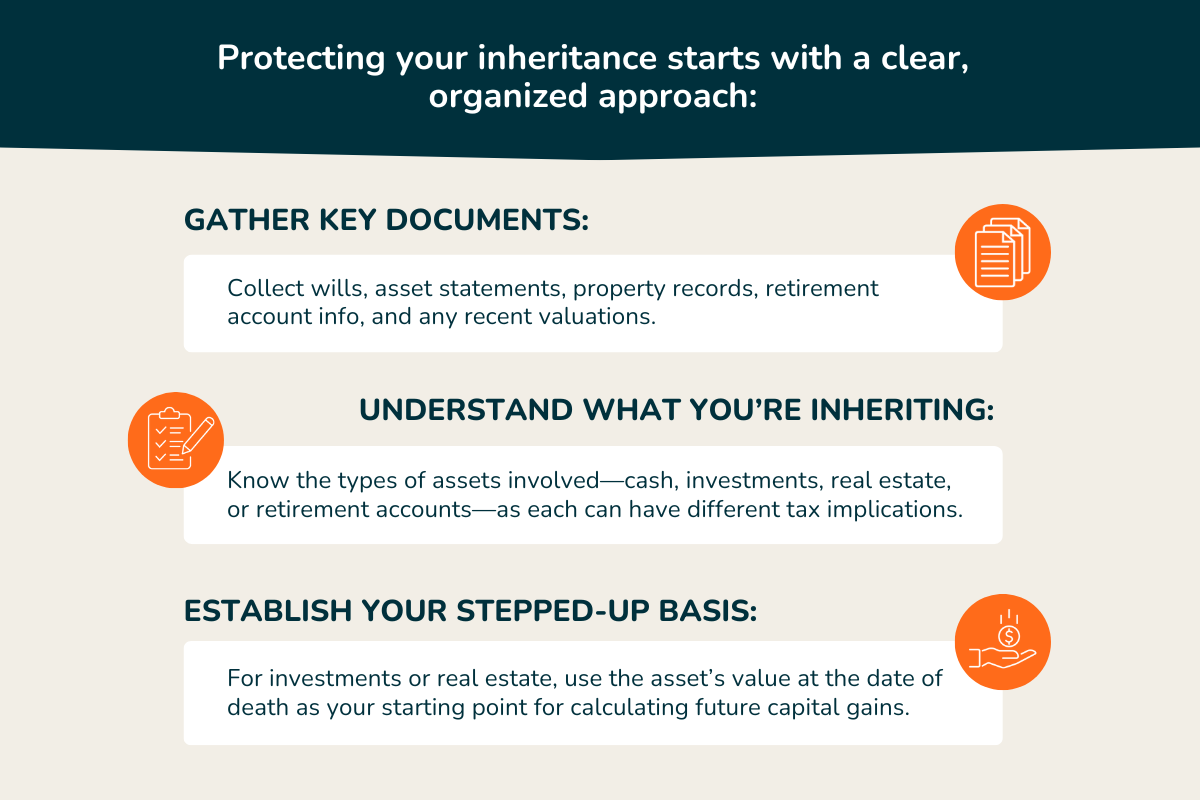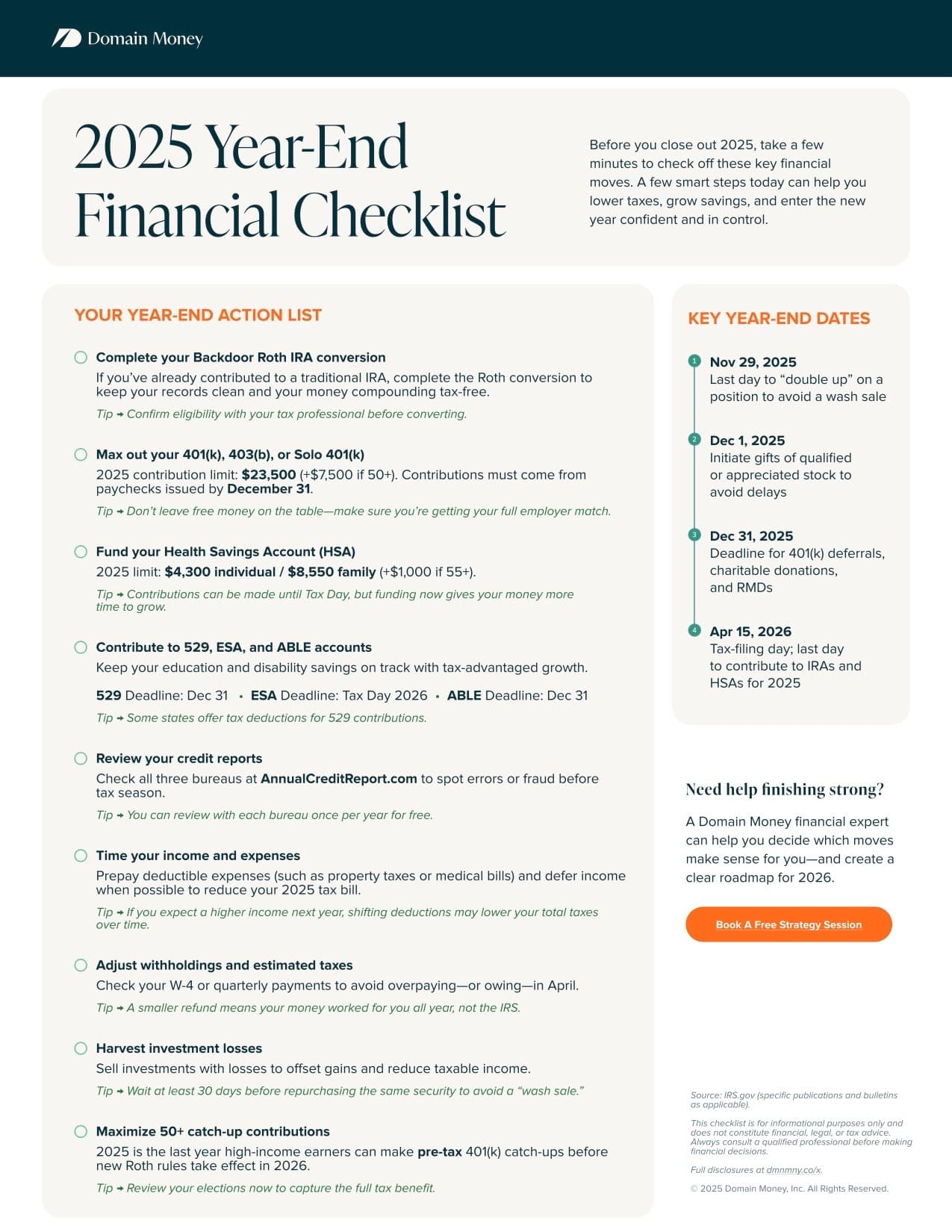Inheriting money or property doesn’t automatically mean facing a big tax bill. Thanks to the federal estate tax exemption of $15 million in 2026, most estates will never owe federal estate taxes. But state rules, retirement accounts, and capital gains can still come into play—sometimes in ways that catch people off guard. What you owe depends on what you inherit, where you live, and how you handle those assets. Here are the essentials to keep in mind:
- Federal vs. state rules matter. Most people won’t hit the federal threshold, but some states still impose inheritance taxes.
- Step-up in basis is your friend. It helps reduce capital gains taxes on inherited investments and property.
- Retirement accounts require strategy. Non-spouse beneficiaries usually need to withdraw funds within 10 years—timing those withdrawals wisely can lower your tax hit.
- Smart planning preserves more. Tools like gifting and trusts can help minimize future tax burdens and give you more control over how wealth is passed on.
How much money can you inherit without paying taxes on it?
Exactly how much money you can inherit without paying taxes on it will depend on your state and the type of assets in your inheritance. But as of 2026, the federal estate tax exemption allows each individual to protect up to $15 million of their estate from federal estate tax ($30 M for couples). This limit applies to the estate before distribution, not to each heir. That’s a lot of breathing room for most taxable estates—but it’s just the starting point.
Keep in mind, the federal exemption is only part of the picture. Many states have their own estate or inheritance taxes, each with different rules and thresholds. The type of assets you inherit also matters: retirement accounts, real estate, or business interests can each come with unique tax implications. Understanding these nuances can help you plan better and keep a bigger portion of what you inherit.
Plus, consulting a financial advisor or estate planning professional can help you navigate all the rules, avoid surprises, and make decisions that align better with your unique long-term financial goals.
Inheritance tax vs estate tax
When someone passes away and leaves you assets, it’s normal to wonder about the taxes. Fortunately, thanks to the federal estate tax exemption, most people won’t owe federal estate taxes on what they inherit.
Here’s how it works: the deceased person’s estate includes all their assets: money, property, and investments. If the total value stays below the federal threshold, no federal estate taxes are due. And unlike income you earn, the inheritance itself isn’t considered taxable income at the federal level.
But taxes can still come into play later. For example, if you inherit stocks and sell them at a higher value than they were at the decedent's date of death, capital gains tax applies to the gains. The same principle applies to real estate and other investments. That’s why understanding your inherited assets—and how you manage them—is crucial.
It also helps to understand the difference between the estate tax and the inheritance tax:
- Estate tax: Paid by the deceased person’s estate before assets are distributed.
- Inheritance tax: Paid by the person receiving the assets. The federal government doesn’t impose this, but some states do.
Only five states have an inheritance tax in place, which are:
- Kentucky
- Maryland
- Nebraska
- New Jersey
- Pennsylvania
Iowa previously had an inheritance tax which phased out in 2025.
On the other hand, ten states and districts impose an estate tax in addition to the federal estate tax, which are:
- Connecticut
- District of Columbia
- Hawaii
- Illinois
- Maryland
- New York
- Oregon
- Rhode Island
- Vermont
- Washington
You may notice that Maryland has both an inheritance and an estate tax in place, giving it an additional layer of complexity.
Certified Financial Planners® at Domain Money can guide you through these nuances. With flat-fee, unbiased advice, our financial advisors can help you understand what you may owe, how to plan ahead, and how to handle inherited investments in a tax-smart way.
Federal estate tax exemptions
The federal estate tax exemption is designed to let most heirs keep what they receive. For 2026, the exemption is $15 million per individual, or $30 million for married couples. If your loved one’s estate falls below these amounts, you likely won’t owe any federal estate taxes.
Exemption thresholds
Here’s what you need to know about the current and upcoming thresholds:
- 2026 exemption: $15 million per individual
- 2025 exemption: $13.99 million per individual ($30 million for married couples)
- Percentage of estates affected: Only about 0.2% of estates pay federal estate taxes
Keeping these numbers in mind can help with planning for people handing down larger estates, and ensure you’re prepared for changes down the line.
What is step-up in basis and why does it matter for an inheritance?
Step-up in basis may sound like complicated jargon, but it’s actually pretty simple and one of the most valuable perks for heirs. Most assets outside of retirement accounts are eligible to have their cost basis "stepped-up" to the assets' fair market value on the decedent's date of death. This can dramatically reduce (or potentially even eliminate) capital gains taxes if you sell soon after inheriting.
For example, imagine your parent bought stock for $10,000 decades ago in a taxable account. By the time they pass away, it’s worth $100,000. If they had sold it while alive, capital gains taxes would apply to the $90,000 gain. Once the stock is inherited, its cost basis is stepped up to the current market value, in this case $100,000. If you sell immediately, there are no gains and you owe no capital gains tax.
Keeping track of estate values and these rules can help maximize what you inherit and avoid surprises when it comes time to sell.
State-level estate and inheritance taxes
While many people focus on federal estate taxes, it’s important to remember that state-level estate and inheritance taxes can also impact what beneficiaries receive. Only a handful of states impose these taxes, and rules vary widely. Inheritance tax rates usually depend on how closely you’re related to the deceased, while estate taxes apply to the total value of the estate before distribution. Knowing the rules in your state can help you plan smarter and keep more of your inheritance.
Here’s a snapshot of key states with estate and/or inheritance taxes, including exemptions and top rates for 2026:
* 2025 rates. The estate tax in Rhode Island and Washington are indexed to inflation and 2026 rates have not yet been released.
Key points to remember:
- Spouses are generally exempt from both inheritance and estate taxes.
- Children and grandchildren usually pay lower inheritance rates, while distant relatives and non-family members face higher rates.
- Maryland is unique in having both estate and inheritance taxes, so careful planning is particularly important there.
- State rules differ, so it’s wise to check your state’s current exemptions and rates before planning inheritances or gifts.
What kinds of assets trigger income tax?
Not all inherited assets are created equal when it comes to taxes. While most inheritances (like cash, property, or stocks) aren’t taxed as income, certain assets can create tax obligations after you receive them. Knowing which ones can help you plan ahead and avoid surprises.
Pre-tax retirement accounts are the most common culprit. Inheriting a Traditional IRA or 401(k) may feel like a windfall, but withdrawals are taxed as ordinary income, just as the original owner would have paid. Thanks to the SECURE Act of 2020, most non-spouse beneficiaries must withdraw inherited retirement accounts down to zero within 10 years, which can create a sizable tax bill if not planned for.
Example: Imagine you inherit a $100,000 Traditional IRA. Over 10 years, you’ll need to withdraw the full amount. If you spread withdrawals evenly, that’s $10,000 per year. Depending on your income, each $10,000 withdrawal could push you into a higher tax bracket, reducing the amount you actually keep. Planning withdrawals strategically can help manage this tax impact.
Other inherited assets, like certain annuities or pensions, can also carry tax implications depending on how distributions are structured. Domain Money’s CFP® professionals can help you:
- Understand the tax treatment of each inherited asset.
- Plan withdrawals strategically to manage income taxes.
- Explore ways to preserve more of your inheritance for long-term goals.
With expert guidance, you can navigate these rules confidently and make informed decisions that fit your financial picture.
What should you do when you inherit a retirement account?
How you handle it depends on your relationship to the account holder and the type of account.
Surviving spouses have the most flexibility. You can roll an inherited IRA into your own account, treating it as if you had saved the money yourself. This gives you control over withdrawals and tax planning.
Non-spouse beneficiaries face stricter rules under the SECURE Act. Most must fully withdraw funds from inherited IRAs and 401(k)s within 10 years. Without planning, this timeline can create a significant tax burden if large amounts are withdrawn all at once.
If you inherit a $200,000 IRA and plan to withdraw it evenly over 10 years, that’s $20,000 per year. Depending on your income, each withdrawal could bump you into a higher tax bracket. Work with a financial planner at Domain Money to strategically time your withdrawals to preserve more of your inheritance.
Capital gains on inherited assets
When you inherit assets, understanding how capital gains tax works can also make a real difference in what you get to keep. Your capital gain is always calculated as the sale price minus the asset’s stepped-up basis—the value of the asset on the date the previous owner passed away.
Luckily, inherited assets automatically get long-term capital gains treatment, no matter how long you hold them. That means you benefit from favorable federal tax rates—0%, 15%, or 20%—depending on your overall income.
If you inherit a stock worth $50,000 (stepped-up basis) and sell it for $60,000, your capital gain is $10,000. You’ll pay long-term capital gains tax only on that $10,000 gain, not the full $60,000.
But even with these rules in your favor, planning can save you headaches and taxes down the road. Domain Money’s fiduciary advisors can help you craft a tax-smart strategy for managing and selling inherited assets—so you make informed decisions without surprises.
How to protect your estate from tax
With a bit of planning, you can preserve more of your hard-earned wealth for your beneficiaries. Understanding the strategies available today helps ensure taxes don’t unnecessarily eat into what you want to pass on.
Lifetime gifting strategies
One of the simplest tools is the annual gift tax exclusion. In 2026, you can give up to $19,000 per recipient each year without it counting towards your lifetime gift and estate tax exemption. Married couples can combine their exclusions to gift $38,000 per recipient. Regular gifting like this not only helps reduce future estate taxes but also allows you to see your loved ones benefit during your lifetime.
Trust planning options
Trusts are a slightly more sophisticated approach, letting you manage inheritance taxes while controlling how assets are distributed. Keep in mind that different trust types serve different purposes. Some focus on tax efficiency, others on protecting beneficiaries from creditors or spending missteps.
If creating a trust sounds a little complex, a financial planner can help match the right structure to your goals, making sure your wealth works as intended.
Protecting your inheritance starts with a clear, organized approach:
- Gather key documents: Collect wills, asset statements, property records, retirement account info, and any recent valuations.
- Understand what you’re inheriting: Know the types of assets involved—cash, investments, real estate, or retirement accounts—as each can have different tax implications.
- Establish your stepped-up basis: For investments or real estate, use the asset’s value at the date of death as your starting point for calculating future capital gains.

Starting here gives you control over your inheritance and lays the foundation for smart, tax-conscious decisions. With the right guidance, you can preserve more wealth for yourself and your beneficiaries.
Can a financial planner help you with estate and inheritance tax?
Estate and inheritance taxes can get complicated fast, and trying to navigate them alone could be costly. A qualified financial planner can help you make sense of your specific situation and develop some strategies that'll align with your goals. They can guide you on which tools—like gifting, trusts, or stepped-up basis strategies—make the most sense for your inheritance.
Domain Money is the perfect option for this kind of planning. Our flat-fee model means you get clear, unbiased advice without worrying about ongoing percentage-based costs. You know exactly what you’re paying for—and can gain some confidence knowing that your plan is tailored to your financial goals.
Keeping more of your inheritance
Tax laws are never fun, especially in sensitive situations like inheritance. But they're something you need to face (and it doesn't need to be complicated). For 2025, the federal estate tax exemption sits at $13.99 million—meaning most Americans won’t owe federal estate taxes. But state taxes, certain asset types, and retirement accounts can still create obligations, so understanding the rules is still important.
Maximizing your benefits starts with documenting your asset values at the time of inheritance, understanding your state’s rules, and planning for retirement accounts to minimize future tax obligations. Staying informed and proactive can help ensure your inheritance works for you, not the taxman.
For expert, personalized guidance, Domain Money’s CFP® Professionals provide flat-fee advice to help you navigate inheritance taxes and create a strategy tailored to your financial goals.
Frequently Asked Questions (FAQ):
Do I need to report inheritance money to the IRS?
While estates with over $600 in income will have to file a tax return at the estate level, inherited money itself isn't considered taxable income when received by beneficiaries. This means that you usually don't have to report it on your personal federal tax return.
How to avoid paying taxes on inherited money?
Using strategies like trusts can help manage estate or inheritance taxes. Assets in a properly structured trust aren’t considered part of the deceased’s estate, which can reduce tax obligations.
What’s the maximum estate value before federal estate tax applies?
At the federal level in 2026, the exemption is $15 million per person. Keep in mind, some states have their own estate or inheritance taxes, and those rules vary widely.









